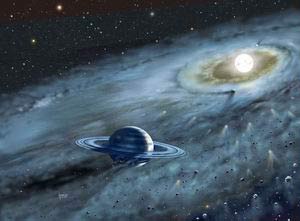Detected more than 362,000 planets
According to Klet Observatory (in the south of the Czech Republic), as of January 1, 2007, astronomers in the world discovered 362,447 planets, including 145,705 numbered planets, 13,479 Named planets and many " dwarf planets ".
 (Photo: elheraldo.hn) " Dwarf planet " is a term adopted by the World Astronomical Union General Assembly (UIA) in a meeting on August 1, 2006; including the planets Eris and Ceres between Mars and Jupiter, as well as Pluto, downgraded to " dwarf planets " in August 2006. These planets belong to the solar system, revolving around the Sun in elliptical orbits and not working like Comets.
(Photo: elheraldo.hn) " Dwarf planet " is a term adopted by the World Astronomical Union General Assembly (UIA) in a meeting on August 1, 2006; including the planets Eris and Ceres between Mars and Jupiter, as well as Pluto, downgraded to " dwarf planets " in August 2006. These planets belong to the solar system, revolving around the Sun in elliptical orbits and not working like Comets.
Until 1923, astronomers worldwide discovered 1,000 planets. But thanks to the advancement of science, the number of newly discovered planets has increased rapidly, from 5,000 in 1991 to 10,000 planets in 1999, about 50,000 planets in 2002 and nearly 250,000 planets in 2005.
Chairman of UIA's Planet and Comet Naming Committee, Jana Ticha, said the LINEAR organization that specializes in the discovery and discovery of near-Earth planets in the United States has contributed most to finding planets. new.
- Discover more than 1000 new planets outside the solar system
- Unknown mystery about planets outside the solar system
- The strange object disturbs the classification of extraterrestrial planets
- Discover more 18 large planets
- Why are planets spherical, and meteorites?
- 8 planets are not true to haunt the scientific world
- Discover more than 700 planets outside the solar system
- Planets in the Solar System
- Dead planets may be signaling in outer space
- Why the dead planet?
- Detecting water on Saturn moon
- Detecting the outer three planets about the size of the Earth
 Van Allen's belt and evidence that the Apollo 11 mission to the Moon was myth
Van Allen's belt and evidence that the Apollo 11 mission to the Moon was myth The levels of civilization in the universe (Kardashev scale)
The levels of civilization in the universe (Kardashev scale) Today Mars, the sun and the Earth are aligned
Today Mars, the sun and the Earth are aligned The Amazon owner announced a secret plan to build a space base for thousands of people
The Amazon owner announced a secret plan to build a space base for thousands of people